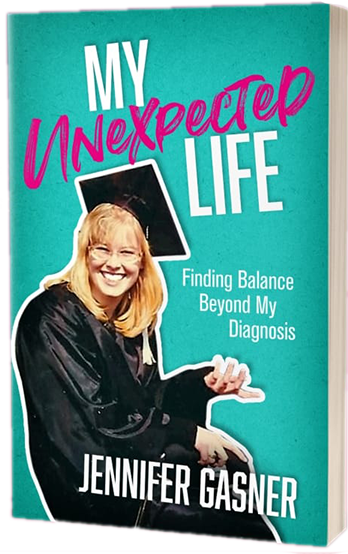Recently, I was looking through old pictures trying to find some image to potentially integrate into the cover of my upcoming memoir, My Unexpected Life: Finding Balance Beyond My Diagnosis. I contemplated whether or not to use a photo where I was walking solo, with my walker, or using my wheelchair.
I was a little surprised to see that when I used a walker, (21-26), it hardly ever appeared. I realized I was ashamed of needing it to help me—I chose, rather, to lean into someone or something. At the time, it made sense. But now, it makes me kind of sad.
I was conditioned into thinking my disabled body made me less attractive or not attractive at all. I rarely saw people with disabilities married or as date material. As a young adult, I wanted to be appealing—not come off as the burden or object of pity the walker evoked. I strove to fit in—be like everyone else.
When I started using a wheelchair, my parents decided to update our family photos, which had last been taken when I was a baby. Although transferring was still relatively smooth for me, I insisted I stay in my wheelchair.
What changed? In the previous year, I had learned much about disability culture and history. It was excluded from any of the lessons I had in school and that annoyed me. How and why was an entire population ignored? I wanted to be sure disability was included in my history.
In addition, I learned that I didn’t need to fix myself or aim for a life that fit the image of “normal.” I was proud to use a wheelchair and didn’t care what others thought. As the photographer snapped the pictures, I smiled, and sat tall in my wheelchair, showing off my disability.
Being disabled is a huge part of my identity and how I view the world. I have to consider accessibility in many places I go or in group activities I do, (especially if I am the only wheelchair user in the gang). I think it’s allowed me to be more empathetic and open to different perspectives.
I am proud because for so long we have been under-valued and under-estimated and we are doing so much. Disability Studies presence has grown in the curriculum at universities and more degrees in the field are available. The understanding that accessibility improves things for everyone, not just people with disabilities, is growing. Representation for disabled artists, actors, writers, and so much more is improving.
Yes, much more work needs to be done. But it’s exciting to, (hopefully), be a part of creating a world where the disability community has a voice and is being portrayed, (finally), positively.


I think your cover should feature all three! All are significant, and none define you. You are a kind, funny, personable, smart person! Show the world all your incarnations.
Gasner I love you to the moon, your spirit since the day I met you was far beyond the stars! You are this beautiful soul who touches everyone you meet, your smile contagious like the giggles! I’m honored to call you my friend! I love to hear you speak /write about your disability but it’s odd I don’t see you as disabled but more of a force of nature living to the fullest & girl you rock sister sunshine!
Oh, I love this post! 😊💜